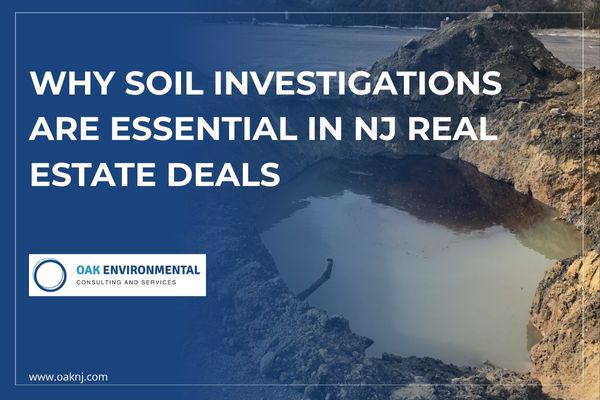
Why Soil Investigations Are Essential in NJ Real Estate Deals
When purchasing or refinancing commercial property in New Jersey, a soil investigation can make or break the deal. Beneath the surface, past land uses often leave contaminants that can derail financing, delay approvals, or trigger costly cleanups. Whether you’re buying, selling, or developing, understanding the property’s subsurface conditions is essential for avoiding surprises and protecting your investment.
In New Jersey where industrial, agricultural, and mixed-use histories are common soil testing isn’t just due diligence, it’s a smart financial safeguard.
Why Soil Investigations Matter
✔ Historical Property Use:
Former gas stations, dry cleaners, machine shops, and agricultural properties often leave behind petroleum, solvents, or pesticides that linger in the soil long after operations have ceased. Even sites that appear clean may still have contamination beneath paved areas or landscaped zones. Testing identifies these issues early, allowing buyers to negotiate cleanup responsibilities before closing.
✔ Hidden Risks:
Contaminated soil can derail redevelopment plans, reduce property value, and even create personal liability for owners or lenders. For example, discovering petroleum contamination during construction can halt work until remediation occurs—often at significant cost. Soil investigations provide a clear picture of potential risks, helping investors make informed decisions.
✔ NJDEP Requirements:
Certain property types or land-use histories automatically trigger soil testing under NJDEP Site Remediation Program (SRP) regulations. These investigations are often needed to satisfy lender requirements, obtain zoning or construction approvals, or meet state cleanup obligations. Failing to comply can result in regulatory penalties and significant project delays.
Common Contaminants Found
‼ Petroleum Hydrocarbons from Leaking Tanks:
Fuel storage tanks—both aboveground and underground—often corrode and leak over time, releasing gasoline or diesel into surrounding soil. Left unaddressed, these contaminants can migrate into groundwater or nearby properties.
‼ Lead, Arsenic, and Other Metals from Industrial Activities:
Manufacturing and metal fabrication sites frequently leave behind elevated heavy metal concentrations. Even small-scale operations can introduce these pollutants into soil, requiring targeted sampling and potential remediation before redevelopment.
‼ Pesticides and Herbicides from Past Agricultural Use:
Older farmlands and nurseries often show residues of legacy pesticides that remain in soil decades later. Developers converting farmland into residential or commercial spaces must confirm that these compounds fall below NJDEP cleanup criteria.
How Oak Helps
Oak Environmental provides fast, accurate, and defensible soil investigation services throughout New Jersey. Our team pinpoints potential Areas of Concern (AOCs), conducts targeted soil sampling, and delivers clear reports that satisfy NJDEP and lender requirements.
We understand that time is money in real estate. That’s why our process focuses on minimizing delays while protecting clients from hidden liabilities. From due diligence investigations to full-scale remediation, Oak helps you close deals with confidence and compliance intact.
Next Steps
If you’re planning a property transaction or redevelopment project in New Jersey, a soil investigation should be your first step. Reach out to Oak Environmental to schedule a consultation or request a proposal. Our team will help you assess potential risks, meet regulatory requirements, and keep your deal moving forward—on time and within budget.